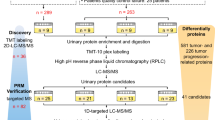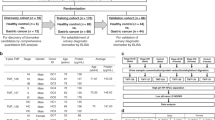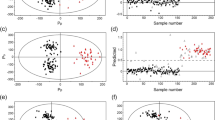Abstract
Background
Currently utilized serum tumor markers and fecal immunochemical tests do not have sufficient diagnostic power for colorectal cancer (CRC) due to their low sensitivities. To establish non-invasive urinary protein biomarkers for early CRC diagnosis, we performed stepwise analyses employing urine samples from CRCs and healthy controls (HCs).
Methods
Among 474 urine samples, 363 age- and sex-matched participants (188 HCs, 175 stage 0–III CRCs) were randomly divided into discovery (16 HCs, 16 CRCs), training (110 HCs, 110 CRCs), and validation (62 HCs, 49 CRCs) cohorts.
Results
Of the 23 urinary protein candidates comprehensively identified from mass spectrometry in the discovery cohort, urinary levels of dipeptidase 1 (uDPEP1) and Trefoil factor1 (uTFF1) were the two most significant diagnostic biomarkers for CRC in both training and validation cohorts using enzyme-linked immunosorbent assays. A urinary biomarker panel comprising uDPEP1 and uTFF1 significantly distinguished CRCs from HCs, showing area under the curves of 0.825–0.956 for stage 0–III CRC and 0.792–0.852 for stage 0/I CRC. uDPEP1 and uTFF1 also significantly distinguished colorectal adenoma (CRA) patients from HCs, with uDPEP1 and uTFF1 increasing significantly in the order of HCs, CRA patients, and CRC patients. Moreover, expression levels of DPEP1 and TFF1 were also significantly higher in the serum and tumor tissues of CRC, compared to HCs and normal tissues, respectively.
Conclusions
This study established a promising and non-invasive urinary protein biomarker panel, which enables the early detection of CRC with high sensitivity.




Similar content being viewed by others
References
Sung H, Ferlay J, Siegel RL, et al. Global Cancer Statistics 2020: GLOBOCAN estimates of incidence and mortality worldwide for 36 cancers in 185 countries. CA Cancer J Clin. 2021;71:209–49.
Siegel RL, Miller KD, Goding Sauer A, et al. Colorectal cancer statistics, 2020. CA Cancer J Clin. 2020;70:145–64.
Shaukat A, Mongin SJ, Geisser MS, et al. Long-term mortality after screening for colorectal cancer. N Engl J Med. 2013;369:1106–14.
Tao S, Haug U, Kuhn K, et al. Comparison and combination of blood-based inflammatory markers with faecal occult blood tests for non-invasive colorectal cancer screening. Br J Cancer. 2012;106:1424–30.
**e YH, Gao QY, Cai GX, et al. Fecal clostridium symbiosum for noninvasive detection of early and advanced colorectal cancer: test and validation studies. EBioMedicine. 2017;25:32–40.
Niedermaier T, Tikk K, Gies A, et al. Sensitivity of fecal immunochemical test for colorectal cancer detection differs according to stage and location. Clin Gastroenterol Hepatol. 2020;18(2920–8):e6.
Thomas DS, Fourkala EO, Apostolidou S, et al. Evaluation of serum CEA, CYFRA21-1 and CA125 for the early detection of colorectal cancer using longitudinal preclinical samples. Br J Cancer. 2015;113:268–74.
Zhao M, Li M, Yang Y, et al. A comprehensive analysis and annotation of human normal urinary proteome. Sci Rep. 2017;7:3024.
Okuda Y, Shimura T, Iwasaki H, et al. Urinary microRNA biomarkers for detecting the presence of esophageal cancer. Sci Rep. 2021;11:8508.
Shimura T, Dagher A, Sachdev M, et al. Urinary ADAM12 and MMP-9/NGAL complex detect the presence of gastric cancer. Cancer Prev Res (Phila). 2015;8:240–8.
Shimura T, Ebi M, Yamada T, et al. Urinary kallikrein 10 predicts the incurability of gastric cancer. Oncotarget. 2017;8:29247–57.
Iwasaki H, Shimura T, Yamada T, et al. A novel urinary microRNA biomarker panel for detecting gastric cancer. J Gastroenterol. 2019;54:1061–9.
Shimura T, Dayde D, Wang H, et al. Novel urinary protein biomarker panel for early diagnosis of gastric cancer. Br J Cancer. 2020;123:1656–64.
Iwasaki H, Shimura T, Kitagawa M, et al. A novel urinary miRNA biomarker for early detection of colorectal cancer. Cancers (Basel). 2022;14:461.
Shimura T, Iwasaki H, Kitagawa M, et al. Urinary cysteine-rich protein 61 and trefoil factor 3 as diagnostic biomarkers for colorectal cancer. Transl Oncol. 2019;12:539–44.
McShane LM, Altman DG, Sauerbrei W, et al. Reporting recommendations for tumor marker prognostic studies. J Clin Oncol. 2005;23:9067–72.
Vandenbroucke JP, von Elm E, Altman DG, et al. Strengthening the reporting of observational studies in epidemiology (STROBE): explanation and elaboration. Epidemiology. 2007;18:805–35.
Sobin LH, Gospodarowicz MK, Wittekind C, et al. TNM classification of malignant tumours. 7th ed. Chichester: Wiley-Blackwell; 2009.
Rappsilber J, Ishihama Y, Mann M. Stop and go extraction tips for matrix-assisted laser desorption/ionization, nanoelectrospray, and LC/MS sample pretreatment in proteomics. Anal Chem. 2003;75:663–70.
**n G, Wang M, Jiao LL, et al. Protein-to-creatinine ratio in spot urine samples as a predictor of quantitation of proteinuria. Clin Chim Acta. 2004;350:35–9.
Ward DG, Nyangoma S, Joy H, et al. Proteomic profiling of urine for the detection of colon cancer. Proteome Sci. 2008;6:19.
Sun Y, Guo Z, Liu X, et al. Noninvasive urinary protein signatures associated with colorectal cancer diagnosis and metastasis. Nat Commun. 2022;13:2757.
Zeng C, Qi G, Shen Y, et al. DPEP1 promotes drug resistance in colon cancer cells by forming a positive feedback loop with ASCL2. Cancer Med. 2023;12:412–24.
Zhang G, Schetter A, He P, et al. DPEP1 inhibits tumor cell invasiveness, enhances chemosensitivity and predicts clinical outcome in pancreatic ductal adenocarcinoma. PLoS ONE. 2012;7:e31507.
McIver CM, Lloyd JM, Hewett PJ, et al. Dipeptidase 1: a candidate tumor-specific molecular marker in colorectal carcinoma. Cancer Lett. 2004;209:67–74.
Park SY, Lee SJ, Cho HJ, et al. Dehydropeptidase 1 promotes metastasis through regulation of E-cadherin expression in colon cancer. Oncotarget. 2016;7:9501–12.
Yajima S, Ishii M, Matsushita H, et al. Expression profiling of fecal colonocytes for RNA-based screening of colorectal cancer. Int J Oncol. 2007;31:1029–37.
Liu Q, Deng J, Yang C, et al. DPEP1 promotes the proliferation of colon cancer cells via the DPEP1/MYC feedback loop regulation. Biochem Biophys Res Commun. 2020;532:520–7.
Yusufu A, Shayimu P, Tuerdi R, et al. TFF3 and TFF1 expression levels are elevated in colorectal cancer and promote the malignant behavior of colon cancer by activating the EMT process. Int J Oncol. 2019;55:789–804.
**ao P, Ling H, Lan G, et al. Trefoil factors: Gastrointestinal-specific proteins associated with gastric cancer. Clin Chim Acta. 2015;450:127–34.
Rodrigues S, Rodrigue CM, Attoub S, et al. Induction of the adenoma-carcinoma progression and Cdc25A-B phosphatases by the trefoil factor TFF1 in human colon epithelial cells. Oncogene. 2006;25:6628–36.
Vocka M, Langer D, Petrtyl J, et al. Trefoil factor family (TFF) proteins as potential serum biomarkers in patients with metastatic colorectal cancer. Neoplasma. 2015;62:470–7.
Tokuhara T, Hattori N, Ishida H, et al. Clinical significance of aminopeptidase N in non-small cell lung cancer. Clin Cancer Res. 2006;12:3971–8.
Sanz B, Perez I, Beitia M, et al. Aminopeptidase N activity predicts 5-year survival in colorectal cancer patients. J Investig Med. 2015;63:740–6.
Wiese AH, Auer J, Lassmann S, et al. Identification of gene signatures for invasive colorectal tumor cells. Cancer Detect Prev. 2007;31:282–95.
Lu X, Pan J, Li S, et al. Establishment of a predictive genetic model for estimating chemotherapy sensitivity of colorectal cancer with synchronous liver metastasis. Cancer Biother Radiopharm. 2013;28:552–8.
Endo K, Kohnoe S, Tsujita E, et al. Galectin-3 expression is a potent prognostic marker in colorectal cancer. Anticancer Res. 2005;25:3117–21.
Krijgsman D, Roelands J, Andersen MN, et al. Expression of NK cell receptor ligands in primary colorectal cancer tissue in relation to the phenotype of circulating NK- and NKT cells, and clinical outcome. Mol Immunol. 2020;128:205–18.
Rasmussen L, Nielsen HJ, Christensen IJ. Early detection and recurrence of colorectal adenomas by combination of eight cancer-associated biomarkers in plasma. Clin Exp Gastroenterol. 2020;13:273–84.
Acknowledgements
We thank Mao Morimoto for supporting urinary analysis and Chiaki Tsuduki, Miki Shioya and Kana Saji for data management of enrolled patients in this study (Department of Gastroenterology and Metabolism, Nagoya City University Graduate School of Medical Sciences).
Funding
This study was funded, in part, by Japan Agency for Medical Research and Development (AMED) under Grant Number JP19lm0203005 (to T. S.), Grant-in-Aid for Research in Nagoya City University Grant Number 2021102 (to T. S.), and the Hori Science and Arts Foundation (to T. S.). The funder played no role in study design, data collection, analysis and interpretation of data, or the writing of this manuscript.
Author information
Authors and Affiliations
Corresponding author
Ethics declarations
Conflict of interest
All authors declare no financial or non-financial competing interests.
Additional information
Publisher's Note
Springer Nature remains neutral with regard to jurisdictional claims in published maps and institutional affiliations.
Supplementary Information
Below is the link to the electronic supplementary material.
Rights and permissions
Springer Nature or its licensor (e.g. a society or other partner) holds exclusive rights to this article under a publishing agreement with the author(s) or other rightsholder(s); author self-archiving of the accepted manuscript version of this article is solely governed by the terms of such publishing agreement and applicable law.
About this article
Cite this article
Okuda, Y., Shimura, T., Abe, Y. et al. Urinary dipeptidase 1 and trefoil factor 1 are promising biomarkers for early diagnosis of colorectal cancer. J Gastroenterol 59, 572–585 (2024). https://doi.org/10.1007/s00535-024-02110-1
Received:
Accepted:
Published:
Issue Date:
DOI: https://doi.org/10.1007/s00535-024-02110-1




